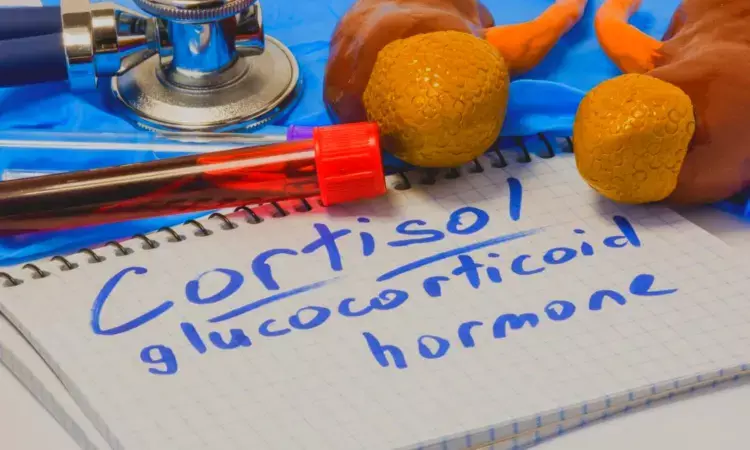- Home
- Medical news & Guidelines
- Anesthesiology
- Cardiology and CTVS
- Critical Care
- Dentistry
- Dermatology
- Diabetes and Endocrinology
- ENT
- Gastroenterology
- Medicine
- Nephrology
- Neurology
- Obstretics-Gynaecology
- Oncology
- Ophthalmology
- Orthopaedics
- Pediatrics-Neonatology
- Psychiatry
- Pulmonology
- Radiology
- Surgery
- Urology
- Laboratory Medicine
- Diet
- Nursing
- Paramedical
- Physiotherapy
- Health news
- Fact Check
- Bone Health Fact Check
- Brain Health Fact Check
- Cancer Related Fact Check
- Child Care Fact Check
- Dental and oral health fact check
- Diabetes and metabolic health fact check
- Diet and Nutrition Fact Check
- Eye and ENT Care Fact Check
- Fitness fact check
- Gut health fact check
- Heart health fact check
- Kidney health fact check
- Medical education fact check
- Men's health fact check
- Respiratory fact check
- Skin and hair care fact check
- Vaccine and Immunization fact check
- Women's health fact check
- AYUSH
- State News
- Andaman and Nicobar Islands
- Andhra Pradesh
- Arunachal Pradesh
- Assam
- Bihar
- Chandigarh
- Chattisgarh
- Dadra and Nagar Haveli
- Daman and Diu
- Delhi
- Goa
- Gujarat
- Haryana
- Himachal Pradesh
- Jammu & Kashmir
- Jharkhand
- Karnataka
- Kerala
- Ladakh
- Lakshadweep
- Madhya Pradesh
- Maharashtra
- Manipur
- Meghalaya
- Mizoram
- Nagaland
- Odisha
- Puducherry
- Punjab
- Rajasthan
- Sikkim
- Tamil Nadu
- Telangana
- Tripura
- Uttar Pradesh
- Uttrakhand
- West Bengal
- Medical Education
- Industry
Levoketoconazole safe and effective treatment option for patients with endogenous Cushing's syndrome

Italy: Treatment with levoketoconazole is beneficial for patients with endogenous Cushing's syndrome, a recent study has stated.
The study, published in Pituitary, showed that levoketoconazole reversibly normalized urinary cortisol and concurrently improved lipid profiles. Also, the researchers could not identify any new risks of levoketoconazole treatment.
Endogenous Cushing's syndrome is a rare endocrine disorder due to chronic overproduction of cortisol, commonly due to a benign pituitary corticotroph tumor.
Endogenous Cushing's syndrome (CS) is an endocrine disease that is rare and caused by excess production of cortisol, most commonly due to a benign tumor in the pituitary corticotroph. Due to cardiovascular complications and infections, such patients have multiple comorbidities and increased death risk.
A phase 3 open-label study (SONICS) that evaluated the drug-specificity of cortisol normalization showed the efficacy of levoketoconazole for endogenous Cushing's syndrome. Considering this, Rosario Pivonello, Università Federico II Di Napoli, Naples, Italy, and colleagues in their study (LOGICS) further investigated the safety and efficacy of levoketoconazole in Cushing's syndrome (CS) patients. Their primary objective was to determine the effect of withdrawal of levoketoconazole treatment to placebo versus treatment continuation with levoketoconazole on the cortisol therapeutic response achieved during open-label levoketoconazole therapy to establish efficacy as explicitly related to levoketoconazole.
LOGICS was a phase 3, randomized-withdrawal, placebo-controlled study with open-label titration-maintenance for 14-19 weeks followed by phases of double-blind, randomized-withdrawal (~ 8 weeks), and restoration (~ 8 weeks).
Based on the study, the researchers found the following:
- During titration-maintenance, 79 patients received levoketoconazole; 39 patients on a stable dose (~ 4 weeks or more) progressed to randomization. 5 SONICS completers and those who did not need dose titration were randomized to receive levoketoconazole (n = 22) or placebo (n = 22).
- All patients with loss of response which was the primary endpoint met the prespecified criterion of mean urinary free cortisol (mUFC) > 1.5 × upper limits of normal.
- During randomized withdrawal, 21 patients withdrawn to placebo (95.5%) lost mUFC response compared with nine patients continuing levoketoconazole (40.9%).
- At the end of randomized withdrawal, mUFC normalization was observed among 11 (50.0%) patients receiving levoketoconazole and 1 (4.5%) receiving placebo; the treatment difference: was 45.5%.
- Levoketoconazole restoration reversed the loss of cortisol control in most patients who had received a placebo.
- In 89% of patients, adverse events were reported during treatment with levoketoconazole (dose-titration, randomized-withdrawal, and restoration phases combined), nausea (29%), and hypokalemia (26%) were commonly reported.
- Prespecified adverse events of particular interest with levoketoconazole were QT interval prolongation (10.7%), liver-related (10.7%), and adrenal insufficiency (9.5%).
"In patients with Cushing's syndrome Levoketoconazole reversibly normalized urinary cortisol. Also, we identified no new risks of levoketoconazole treatment," the researchers wrote.
"Together, these findings support levoketoconazole use as a treatment option for adult patients with CS," they concluded.
Reference:
Pivonello, R., Zacharieva, S., Elenkova, A. et al. Levoketoconazole in the treatment of patients with endogenous Cushing's syndrome: a double-blind, placebo-controlled, randomized withdrawal study (LOGICS). Pituitary (2022). https://doi.org/10.1007/s11102-022-01263-7
Dr Kamal Kant Kohli-MBBS, DTCD- a chest specialist with more than 30 years of practice and a flair for writing clinical articles, Dr Kamal Kant Kohli joined Medical Dialogues as a Chief Editor of Medical News. Besides writing articles, as an editor, he proofreads and verifies all the medical content published on Medical Dialogues including those coming from journals, studies,medical conferences,guidelines etc. Email: drkohli@medicaldialogues.in. Contact no. 011-43720751


